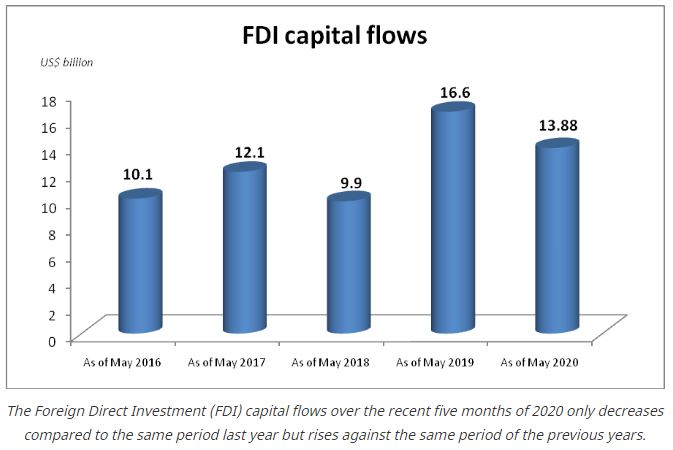Vietnam: FDI attraction – one of five key solutions to post-Coronavirus economic recovery
 The Foreign Direct Investment (FDI) capital flows over the recent five months of 2020 only decreases compared to the same period last year but rises against the same period of the previous years.
The Foreign Direct Investment (FDI) capital flows over the recent five months of 2020 only decreases compared to the same period last year but rises against the same period of the previous years.
The COVID-19 pandemic has seriously affected foreign investment inflows that witnessed a year-on-year decrease of 17% to US$13.88 billion in the first five months this year, according to the Foreign Investment Agency, under the Ministry of Planning and Investment.
Of the figure, the newly-registered capital and additional capital hit US$7.44 billion and US$3.45 billion, respectively while the capital contribution and share purchase of foreign investors stood at US$3 billion.
The Jan-May FDI figure, however, was still higher than that of the same period from 2016-2018, with US$10.1 billion in 2016, US$12.1 billion in 2017 and US$9.9 billion in 2018.
The FDI decline in the reviewed period is attributed to the shrinkage in capital contribution and share purchase of foreign investors (US$3 billion in 2020 and US$7.65 billion in 2019).
Meanwhile, the newly-registered and additional volume of US$7.44 billion and US$3.45 billion, respectively, are still higher than the figures recorded last year (US$6.46 billion and US$2.63 billion).
Remarkably, Bac Lieu LNG-fired thermal power plant capitalized at US$4 billion is the biggest FDI project in the Mekong Delta region in the first five months.
Viet Nam-spotlight in welcoming transition of global supply chain
With Apple moving parts of its popular AirPods wireless earphones production chain into Viet Nam for the first time this quarter and many U.S. firms actively seeking for opportunities in Viet Nam are among positive signals indicating that the nation has emerged as a spotlight in welcoming the transition of investment in the next period.
Viet Nam’s priorities are stable costs, exchange rates and institutions, according to the SSI Securities Corporation, adding that foreign projects set up in industrial parks in the country were up 32% year-on-year in the first four months of the year to US$9.8 billion.
Many large U.S., Japanese and European companies are gearing up to shift production to Viet Nam among other ASEAN peers like Indonesia, Thailand and Malaysia.
The nation also offers support to businesses, with many incentives for large FDI projects, and has joined a network of free trade agreements in which Indonesia is not a signatory. Recently, the Vietnamese dong has been very stable compared to the Indonesian rupiah.
FDI among five pillars for economic recovery
At the meeting between the Government and businesses on May 9, Prime Minister Nguyen Xuan Phuc clarified five key measures to recover the economy including attracting investment from domestic economic sectors, boosting up exports, enhancing public investment, promoting domestic consumption and attracting FDI.
During the a meeting on May 22, PM Phuc stressed the need to deliberate on concrete measures to optimize the investment flows shifted to Viet Nam, especially from major multinational groups and high-tech firms.
The Government leader ordered a plan to address bottlenecks against investors, with focus laid on such matters like land clearance and human resources.
The Government has made it clear on several occasions that it gives priority to luring high-tech and high added-value projects and urged authorities to take concrete actions to facilitate operations of all economic sectors, particularly the private one.
Prof. Nguyen Mai, President of the Viet Nam Association of Foreign Invested Enterprises (VAFIE), said that the global investment shift and the EU-Viet Nam Free Trade Agreement offer Viet Nam big opportunities.
The COVID-19 pandemic is causing consequences, however, it is expected to bring golden opportunity for the nation to make breakthrough in FDI attraction, he added. VGP
Thuy Dung
Source: https://vietnamnet.vn/en/business/fdi-attraction-one-of-five-key-solutions-to-post-coronavirus-economic-recovery-645536.html


 English
English




